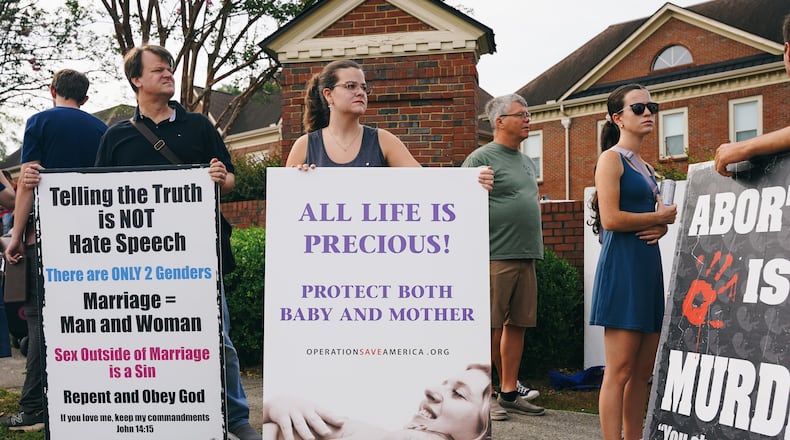The current restrictions on abortion in Georgia should remain in place, the state Supreme Court ruled Tuesday.
That means most abortions will continue to be banned once a doctor can detect fetal cardiac activity, typically about six weeks into a pregnancy and before many know they are pregnant, while the Fulton County Superior Court considers other arguments made by abortion advocates and providers about why the restrictions should be lifted.
Claire Bartlett, executive director of the anti-abortion Georgia Life Alliance, called the ruling a “huge win.”
“We’re thrilled to pieces about the news,” she said. “The battle continues as it goes back to (Fulton Superior) Judge Robert McBurney for determination of their claim that there’s a right under the Georgia Constitution to abortion, which in our reading it does not. But we shall see.”
The SisterSong Women of Color Reproductive Justice Collective and other abortion rights groups and providers argued that when the state statute passed in 2019, Roe v. Wade was the law of the land and the state constitution does not allow the Legislature to enact statutes that violate the law.
The U.S. Supreme Court’s 1973 ruling in Roe v. Wade, which guaranteed a right to an abortion until a fetus was viable outside the mother’s body, was overturned in 2022.
The state argued that it didn’t matter whether the law was not constitutional when it passed the General Assembly in 2019, it is now in line with the law as established when the U.S. Supreme Court ruled in Dobbs v. Jackson Women’s Health Organization that the 1973 decision had been wrong all along.
Georgia’s Supreme Court justices agreed 6-1 with the state’s argument. Two justices did not participate in the oral arguments in March.
“The holdings of United States Supreme Court cases interpreting the United States Constitution that have since been overruled cannot establish that a law was unconstitutional when enacted,” Justice Verda Colvin wrote in the majority opinion.
Gov. Brian Kemp praised Colvin, whom the governor appointed to the Supreme Court in 2021, in a statement about the opinion. Kemp ran in 2018 promising to be the candidate who would pass one of the nation’s most restrictive abortion laws.
“I applaud Justice Colvin and the Georgia Supreme Court for ruling today that our written Constitution controls over judge-made law,” Kemp said in a statement. “Today’s victory represents one more step towards ending this litigation and ensuring the lives of Georgians at all ages are protected.”
Justice John Ellington wrote in a dissenting opinion that he agreed with the abortion rights advocates’ argument that the statute was not passed legally.
“Section 4 of the (2019 abortion law) was void when passed because its ban on most abortions after embryonic cardiac activity can be detected, which the parties agree occurs at approximately six weeks after a woman’s last menstrual period, would unduly interfere with a woman’s then-protected right under the United States Constitution to terminate a pregnancy before viability,” he wrote.
Andrea Young, executive director of the American Civil Liberties Union of Georgia, said the organization will continue to fight for the abortion law to be overturned. Attorneys with the ACLU represented the abortion rights groups in court.
“Be clear, the right to abortion is on the ballot in 2024,” Young said. “Gov. Brian Kemp and the Georgia Legislature acted to take away our rights. The Georgia Legislature can restore our rights, and we must organize to elect a pro-choice Legislature.”
A coalition of abortion rights activists initially successfully sued Georgia in federal court in 2019 after the Legislature passed the law, blocking it from taking effect. But when the U.S. Supreme Court ruled last year in Dobbs, the 11th U.S. Circuit Court of Appeals allowed the state law to take effect.
Abortion rights activists and providers then took their opposition to state court, where they argued, among other things, that Georgia’s Constitution granted more expansive rights to privacy than the U.S. Constitution.
In November 2022, McBurney sided with SisterSong and ordered the state to no longer enforce the law, which had been in effect in Georgia since July of that year. At the time, McBurney noted that he did not rule on the constitutionality of the law.
The state appealed the case to the state Supreme Court, which quickly ordered that the law remain in effect during the legal process.
The state Supreme Court’s decision Tuesday sends the case back to McBurney, who will now consider other arguments made about the constitutionality of the law.
Monica Simpson, executive director for SisterSong — the lead plaintiff in the case — said the ruling means Georgians who want later abortions but can’t have them will continue to suffer.
“This abortion ban has forced Georgians to travel across state lines at great expense or continue the life-altering consequences of pregnancy and childbirth against their wills,” she said. “This decision only further disregards us, our bodily autonomy and our lives.”
Experts for the state said last year that having an abortion had a greater negative effect on the mental and physical health of the mother than having an unwanted child. Experts testifying on behalf of abortion rights advocates said carrying an unwanted pregnancy to term has more of a negative effect on a patient’s mental and physical health.
It’s unclear when McBurney will issue a ruling on the other arguments made in the case or whether he will ask attorneys to file updated arguments before any potential ruling.
About the Author
Keep Reading
The Latest
Featured



